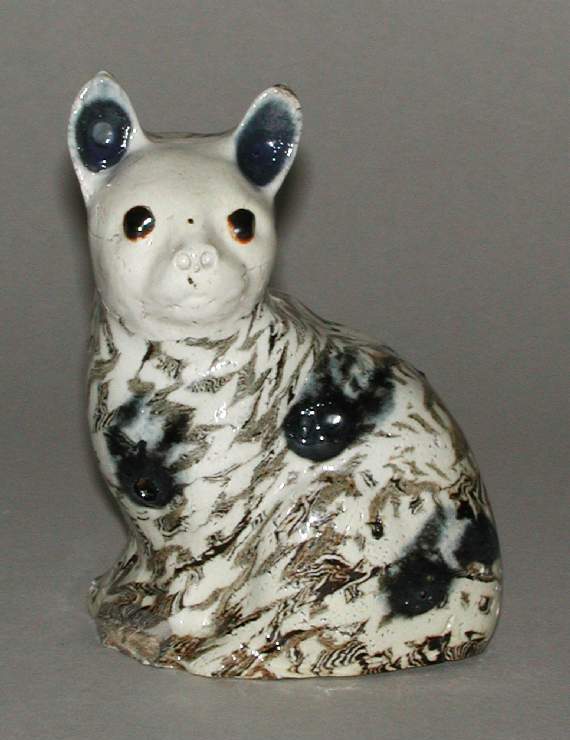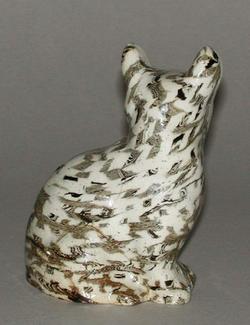Current Location: In storage
Titles
Cat
Maker(s)
Factory:
Unidentified Staffordshire Pottery
Entities
Categories
Description
Agate stoneware press-moulded, coloured in places with slips and salt-glazed.
Agate stoneware made from cream, grey and brownish-black appearing clays, press-moulded, decorated with brown and blue-stained slips and salt-glazed. There is no base and the figure is hollow. The sitting cat has its head turned at a right-angle to its body. Cream-coloured clay is used for the face of the animal. There are four patches of blue-stained slip on the front of the cat and one inside each ear. The eyes of the cat are marked with brown slip.
Notes
History note: Provenance uncertain before Mr A.S. Perry, Exhibition Road, London, who sold for £17.10 on 8 May 1928 to Dr J.W.L. Glaisher, FRS, Trinity College, Cambridge
Legal notes
Dr J.W.L. Glaisher Bequest.
Measurements and weight
Height: 9.6 cm
Width: 7.9 cm
Acquisition and important dates
Method of acquisition: Bequeathed
(1928-12-07)
by
Glaisher, J. W. L., Dr
Dating
18th Century, third quarter
George II
George III
Production date:
circa
AD 1760
Note
Cats were the most common animal figure to be produced in salt-glazed stoneware with examples made from agate-ware being particularly common. There are numerous examples of cats that are comparable to this one with agate bodies, white faces and splashes of blue colour in their ears and over their fronts. Such cats were traditionally dated to around 1740 but are now dated closer to 1760.
Components of the work
Body
composed of
slip
( blue-stained, applied in spots to body and ears)
agate stoneware
Eyes
composed of
slip
( brown, applied to eyes)
Face
composed of
white stoneware
Materials used in production
Salt-glaze
Techniques used in production
Press-moulding
: Cream, grey and brownish-black clays have been wedged together to create an agate-effect body which has been press-moulded in two halves, along with a piece of plain cream clay for the face of the cat; splashes of brown slip and blue-stained slip have been applied to parts of the cat and the figure has been salt-glazed, leaving it with the pitted ‘orange peel’ surface texture typical of salt-glazed wares
Slip painting
Salt-glazing
References and bibliographic entries
Identification numbers
Accession number: C.788-1928
Primary reference Number: 76056
Old catalogue number: 5026
Stable URI
Audit data
Created: Saturday 6 August 2011
Updated: Tuesday 30 April 2024
Last processed: Tuesday 15 July 2025
Associated departments & institutions
Owner or interested party:
The Fitzwilliam Museum
Associated department:
Applied Arts





